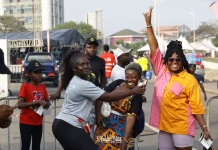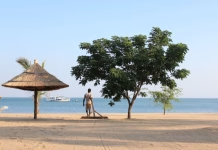The independence constitution of 1957
Besides setting up a parliamentary system of government, the 1957 Constitution provided for the representation of chiefs and tribal authorities in the regional councils, converted the legislative assembly to the national assembly, and entrenched clauses relating to its amendments. Amendments to the Constitution in 1960 transformed Ghana into a Republic under a president and set up one-party state.
Constitutional and political developments: 1960–1988
The constitutional amendments of 1960 gradually transformed Ghana into a one-party state in which fundamental rights and political participation were either severely restricted or completely banned. During these years, Ghana championed the liberation and independence movements across Africa while internally becoming an authoritarian state. The outcome was deep resentment and internal opposition to the Nkrumah regime, resulting in numerous military take-overs and unstable military regimes in 1966, 1969, 1972, 1978, 1979 and 1981.
Following the continuous downward spiral of the country under the successive military regimes, Flight Lt Jerry Rawlings of the Armed Forces Revolutionary Council (AFRC), which had been responsible for the 1979 coup d’état, successfully staged another in 1981. The AFRC, though often criticized, considered itself on both occasions as responsible for restoring a sense of responsibility, direction, morality and accountability in the development of the state.
The coup d’etat of 1981 set out to implement far-reaching reforms that set the country back on the path to democracy and development. It suspended the 1979 Constitution as well as its institutions. A nine-member Provisional National Defence Ruling Council (PNDC) with legislative and executive powers was set up to preside over the reforms. To directly develop and implement the strategy for democratic restoration, a National Commission for Democracy (NCD) was established. The PNDC also decentralised government by setting up elected regional assemblies and elected district assemblies to bring the government closer to the people.
Constitutional reforms in the 1990s
In line with its vision of fully restoring the country to a democratic system of governance and also spurred by similar democratic trends across the region in the 1990s, the PNDC authorised the NDC to embark on a public consultation process designed to collect, analyse and collate Ghanaians views on the form of state they desired. The process led to a report which resulted in the appointment of an inclusive 258-member Committee of Experts to draw up constitutional proposals for consideration by a Consultative Assembly. The Assembly prepared a draft constitution based on proposals submitted to it by the PNDC, as well as previous constitutions of 1957, 1969, and 1979, and the report of the Committee of Experts. The final draft constitution was unanimously approved by the people in a referendum on 28 April 1992. This Constitution, also known as the Constitution of the Fourth Republic was promulgated in January 1993.
The constitution of the Fourth Republic
The 1992 constitution, as the supreme law of the land, provides for the sharing of powers among a president, a parliament, a cabinet, a Council of State, and an independent judiciary. Through its system of checks and balances, it avoids bestowing preponderant power on any specific branch of government
The 1992 Constitution was based upon the democratic principles established by the 1957, 1969, and 1979 Constitutions as well as 258 member Committee of Experts, who submitted a slew of Constitutional proposals that would be approved by the Consultative Assembly.
The final draft constitution was unanimously approved by the people in a referendum on 28 April 1992. This Constitution, also known as the Constitution of the Fourth Republic was promulgated in January 1993.
The new constitution entered into force on 7 January 1993, to found the Fourth Republic. On that day, Rawlings was inaugurated as president and members of parliament swore their oaths of office.
The Constitution of the fourth republic, promulgated in 1993, provided for the following:
- Reinforcement of the unitary nature of the state while allowing for decentralization and local government
- A US style presidential system of government with an executive president elected for a four year term, renewable once.
- Greater press freedom and fundamental human rights guarantees
Ongoing constitutional reform process
In 2008, John Atta Mills won the presidential elections on a platform of, inter alia modernising the Ghanaian constitution. In keeping with the promise, the government established a Constitutional Review Commission in January 2010. The Commission, which has a three year mandate, has three key roles:
- Ascertain from the people of Ghana their views on the operation of the 1992 Fourth Republican Constitution and, in particular, the strengths and weaknesses of the Constitution
- Articulate the concerns of the people of Ghana as regards the amendments that may be required for a comprehensive review of the 1992 Constitution
- Make recommendations to the Government for consideration and provide a draft Bill for possible amendments to the 1992 Constitution
Key issues submitted by the population for consideration
These are questions that relate to the following categories:
- Executive
- Judiciary
- Parliament
- Decentralisation
- Independent constitutional bodies
- Chieftaincy
- Human rights
- Public services
- Transitional provisions
The review process, which is expected to be completed by 2013 is, therefore, not expected to result in the replacement of the constitution, but rather to suggest amendments which can be made to improve it.
Timelines
| December 2009 | John Atta Mills is elected president on the platform of change |
| January 2010 | Following Cabinet approval of a memorandum on constitutional review, the CRC is set up to drive the process |
| February | First Press Conference of the CRC |
| April | July 2010 – District and community level consultations held |
| August – November 2010 | Regional level consultations |
| March 2011 – | National Constitutional Conference (see Conference Brief and Tentative Programme) |
| 2013 – | Expected completion date of process |
Read Also >>> GHANA’S CONSTITUTION; WITH AMENDMENTS THROUGH 1996 >>>



















